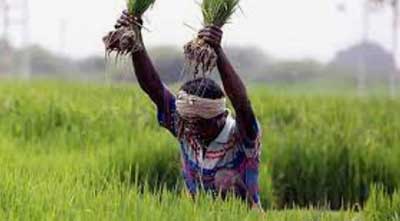Relevance: GS-3: Issues related to Direct and Indirect Farm Subsidies and Minimum Support Prices;
Key Phrases: water-guzzling crops; Environmental and agroecological neglect; National Commission of Farmers; A2+ FL; A2+FL+C2; CACP, CCEA; nutritional and food security.
Why in News?
- The government has hiked the minimum support price (MSP) for this year’s paddy crop by Rs 100 per quintal over 2021-22.
Key Highlights
- The hike is higher than the Rs 72, Rs 53 and Rs 65 per quintal increase during the preceding three years, while below the Rs 180-200 of 2018-19, announced just before the general election of 2019.
Who Decides MSP?
- The Commission for Agricultural Costs & Prices (CACP) recommends MSP to CCEA (Cabinet Committee on Economic Affairs), which takes the final decision.
- CACP is an attached office of the Ministry of Agriculture and Farmers Welfare, Government of India.
- The commission has a Chairman, Member Secretary, 1 official member and 2 non-official members, with non-official members representing the farming community.
MSP is announced for which crops?
CACP recommends MSPs of 23 commodities, which comprise:
- 7 cereals (paddy, wheat, maize, sorghum, pearl millet, barley and ragi),
- 5 pulses (gram, tur, moong, urad, lentil),
- 7 oilseeds (groundnut, rapeseed-mustard, soybean, sesamum, sunflower, safflower, nigerseed), and
- 4 commercial crops (copra, sugarcane, cotton and raw jute)
How is MSP decided?
- MSP is calculated by CACP on the basis of the formula of 1.5 * (A2 + FL)
- A2 refers to costs incurred by farmers on inputs like Seeds, Fertilizers, etc
- FL refers to the imputed cost of family labour.
- The 2nd Famers Commission under the chairmanship of Dr.M S Swaminathan
had recommended to also include C2 in MSP, along with A2 + FL. C2 includes:
- Rentals foregone on owned land.
- Interests foregone on fixed capital assets.
The decision to hike MSP
- The CACP has estimated the average production cost of paddy (all paid-up expenses plus an imputed value of unpaid family labour) for 2022-23 at Rs 1,360 per quintal.
- As per the formula 1.5*(A2+FL) i.e. 1.5 * Rs 1360 is Rs 2040.
- Thus, farmers are only being compensated for higher cultivation costs.
Storing enough grains
- A more pertinent factor for this hike has to do with public food grain
stocks.
- On June 1, it is the lowest for wheat in 14 years [311 lakh tonnes (lt)].
- Although rice stocks are above last year’s corresponding level of(496 lt vs 491 lt).
- The government is not taking chances. Rice will be the major crop for ensuring food security as the next wheat crop will be available for procurement by 2023.
- Hence, the need to ensure adequate stocks and procurement of paddy, whose plantings take off in June and marketing from October.
- Barely three months ago, the country had enough grain for free
distribution through ration shops and also for exports.
- But, the post-March heat wave that took a toll on wheat crop yields and more than halved government procurement has made things difficult from the purview of food security.
Issues with the hike in MSP
- A short-term move to bolster government cereal stocks.
- Instead, the government could expand the area of procurement and relax the procurement criteria for shrivelled wheat.
- It undermines the cause of crop diversification.
- As the farmers are psychologically forced to grow crops that have been announced for procurement.
- Environmental and Agro-ecological neglect
- Cultivation of water-guzzling paddy and sugarcane (in states like Punjab, Haryana, Maharashtra and Telangana) over oilseeds, pulses, cotton, fruits, vegetables and other high-value crops is ill-advised.
- Such practices must be discouraged from a long-term nutritional as well as agro-ecological perspective.
Conclusion
- The current system of assured MSP and open-ended procurement for only paddy, wheat and sugarcane cultivated in a handful of states is simply unsustainable, both fiscally and environmentally.
- Depleted public stocks and high global prices of cereals are temporary phenomena. The government should not take its eye off the real reform road ahead.
Source: Indian Express
Mains Question
Q. What is the Minimum Support Price? Explain the reasons for the recent hike in MSP for Paddy? What are the associated challenges of this hike?







